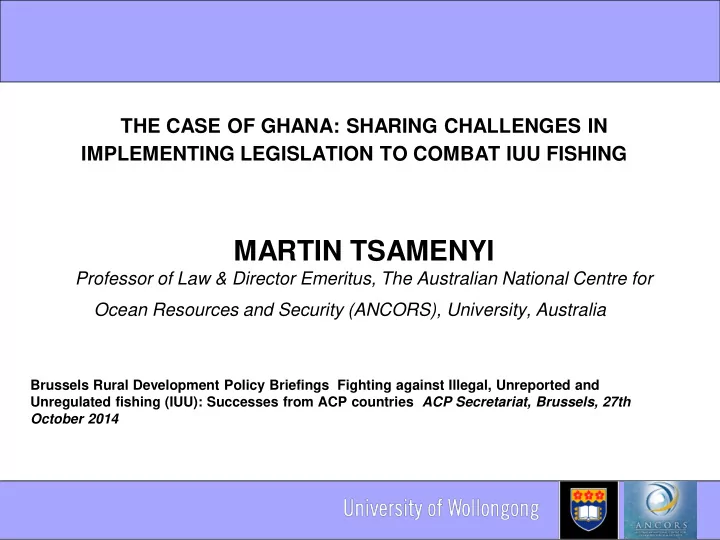

THE CASE OF GHANA: SHARING CHALLENGES IN IMPLEMENTING LEGISLATION TO COMBAT IUU FISHING e legislation to combat IUU fishing MARTIN TSAMENYI Professor of Law & Director Emeritus, The Australian National Centre for Ocean Resources and Security (ANCORS), University, Australia of Wollongong ? Brussels Rural Development Policy Briefings Fighting against Illegal, Unreported and Unregulated fishing (IUU): Successes from ACP countries ACP Secretariat, Brussels, 27th October 2014
GHANA’S IUU FISHING CHALLENGES AT A GLANCE • Ghana was formally issued with a “Yellow Card” under the EC IUU Regulations on 26 November 2013
GHANA’S IUU FISHING CHALLENGES • IUU fishing in neighbouring countries and the high seas by Ghanaian flagged fishing vessels • IUU fishing within the Ghanaian EEZ • Lack of effective enforcement of fisheries legislation • Lack of effective monitoring of fishing vessels through VMS • Non-implementation of international obligations (especially ICCAT Recommendations) • Over-capacity in the fisheries exacerbated other IUU problems • Inadequate and ineffective sanctions framework
WHAT WENT WRONG IN GHANAs? • Policy Failure – Policy vacuum • Management failures • Weak law enforcement • Inadequate legislation • Under-resourced fisheries administration • Investment in fisheries management and administration is not commensurate with value of the fisheries to the country – generates over US$ 1 billion in revenue per year – accounts for at least 4.5% of Ghana’s GDP – Employs 2.4 million people or 10% of the population – accounts for 60 per cent of animal protein consumed in Ghana.
WHAT WENT WRONG IN GHANAs? • Unregulated fishing industry • Lack of awareness of concept of IUU Fishing • Lack of framework for regional cooperation
CENTRALITY OF LEGISLATIVE REFORM • Legislative Reform became one of the centrepieces of the post “Yellow Card” dialogue process with EC – Outmoded legislative framework (enacted in 2002) – Lack of effective implementation – No deterrent sanctions framework
CONTENT OF LEGISLATIVE REFORM • Transitional Legislation comprehensively addressing all aspects of IUU fishing • Legislation currently before Parliament, with Executive request to pass it under a ‘Certificate of Urgency”
CONTENT OF NEW LEGISLATION • Comprehensive provision to control Ghanaian vessels and operators fishing in Ghanaian waters, foreign countries and high seas • Provisions to prevent registration of vessels with history of IUU fishing • Requirement of VMS as a condition for license and going to sea • Comprehensive requirements on the landing of fish and catch certification • Comprehensive provisions to implement the FAO Port State Measures Agreement
CONTENT OF LEGISLATIVE FRAMEWORK • Concept of IUU fishing introduced and linked to concept of serious violation – Severe sanctions for the commission of a serious violation • Minimum fine of $ 1miilion (US) and maximum of $2million for a serious violation • Repeat offences within six months carry minimum of $2 million and maximum of $ 4 million, plus cancellation of license and deregistration of fishing vessel • Non-compliance by fisheries administrators with IUU verification requirements classified as serious violation under the Public Service Regulations – Dismissal – Imprisonment
LESSONS TO BE SHARED FROM THE GHANAIAN EXPERIENCE • Don’t be in denial • See the “Yellow C ard”/” “Red C ard” as an opportunity for genuine reform • It is good for you – Opportunity for high level political support and commitment for the fisheries sector – Opportunity to obtain more resources to manage the fisheries – Opportunity to gain industry support and compliance with needed reform
CONCLUDING OBSERVATIONS • The EC IUU Regulations can be beneficial – Tremendous progress in Ghana within a period of 12 months: A success case, even through ‘Yellow Card” has not been removed • Wouldn’t have happened without the “Yellow Card”
CONCLUDING OBSERVATIONS • Would the reform continue after the ‘Yellow Card”? • My view is YES – The reform momentum generated can be self sustaining – Fisheries administrations know that it is no longer Business as usual ”. – Executive commitment to the fisheries sector brought about by the ‘Yellow Card” – Industry awareness and pressure on Government
CONCLUDING OBSERVATIONS • Fisheries governance challenges in many countries is systemic and cuts across the fisheries sector • Sustainable fisheries management is a continues process of improvement and cannot be achieved 100% in one year – Recommendation for EC to develop a framework for continuing engagement post “Yellow Card” to support continuing improvement
THANK YOU FOR LISTENING
Recommend
More recommend